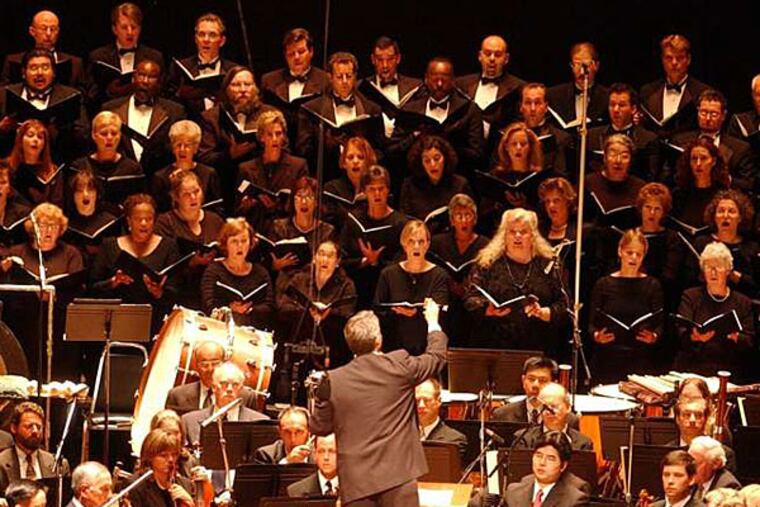Philadelphia Singers to disband after this season
In the wake of leadership changes and the loss of funding from a major supporter, the Philadelphia Singers has decided to cease operations.

In the wake of leadership changes and the loss of funding from a major supporter, the Philadelphia Singers has decided to cease operations.
The city's pioneering professional chorus will sing its last notes at a May concert, and then the organization will dissolve.
The chorus was founded in 1972.
The Philadelphia Singers' board voted to shut down after learning in November that the William Penn Foundation had turned down a request for a three-year grant for general support; after its executive director resigned; and in view of $125,000 in debt, said Michael Martin Mills, board vice president.
"This organization has had near-death experiences before, and this is one we can't get around," Mills said.
The chorus - which performs both on its own and with other groups, including the Philadelphia Orchestra - had been seeking a new music director to replace David Hayes, who leaves this season nearly two years after announcing his plan to depart. Finalists for the job, winnowed to a dozen, were told of the shutdown Monday, as were members of the chorus just before an evening rehearsal for Sunday's Handel's Messiah with the orchestra.
The Philadelphia Orchestra dropped the Philadelphia Singers as its resident chorus after the 2008-09 season, but this was not a contributing factor in the decision. "The relationship with the orchestra is frustrating, but in reality that is pass-through money," Mills said, that did not contribute income to the bottom line of running the organization.
William Penn has been a steady funder of the Philadelphia Singers, providing a substantial portion of the annual operating budget of about $500,000. Penn grants were $150,000 in 2012-13, $150,000 in 2011-12, $100,000 in 2010-11 and $148,000 in 2009-10.
In the last round of applications, the Penn foundation cited the chorus' debt as an impediment to approval, as well as "changing priorities," Mills said. William Penn executive director Laura Sparks said the foundation "launched a new set of priorities" in 2013 that "put a specific focus on organizational management and financial health," and that "makes us focus very hard on the issue of long-term viability."
The Philadelphia Singers' challenges threatened to cascade. William Penn has a policy of not giving operating support to groups in leadership transition, so with its executive director leaving, the soonest the chorus could have applied for another William Penn grant - had it decided to try to stay afloat - would have been mid-2016, Mills said.
Asked whether the Philadelphia Singers' board considered mounting a save-the-chorus campaign, Mills said: "It's a perpetual fund-raising drive around here. We were pretty confident that the funding community of Philadelphia - individuals with a history of support for choruses - would not meet our needs. It's probably accurate to say that no chorus in Philadelphia has had multiple deep-pocket donors. We've got to face reality, that we don't have people willing to step up and write us five-figure checks for this year and next year and the year after that."
The board also did not want to turn the chorus into an all-volunteer group. The ensemble exists in two forms, the larger chorale, which includes some volunteers, and the 32-member professional chorus. Income from these paid jobs is hardly a living wage - the top total fee for two recent Christmas concerts with nine rehearsals was $795, Mills said - but it has kept good singers in town by providing a core around which they could add other gigs and teaching. This year the Philadelphia Singers has presented three of its own programs, and, said an orchestra spokeswoman, will have appeared with the Philadelphia Orchestra in five works.
"This is going to hit some of them very hard," Mills said of the lost income for singers.
Longtime former board member William B. McLaughlin 3d said the group had been a favorite of conductor Wolfgang Sawallisch, and recalled high points with him, the New York Philharmonic and Kurt Masur, and a recording with Benita Valente and Judith Blegen on RCA of the Handel Roman Vespers.
"I remember at one of the very first concerts in 1972, at Friends Select, it was an amazing sound," he said. "I don't mean to demean volunteer choruses, but here was a depth of sound and a solidity of ensemble and insight into phrasing that professional singers brought to the performance that illuminated the work."
The group has two more programs planned. Concerts in March feature Menotti's The Unicorn, the Gorgon, and the Manticore, and the East Coast premiere of Jake Heggie's The Radio Hour.
May's concert has long been planned as the last for David Hayes, who took over in 1992 after serving as assistant to founding conductor Michael Korn. Now, the May concert will also be the group's last.
Said McLaughlin: "It's an artistic tragedy that such an institution is not going to be a part of the cultural landscape here anymore."
215-854-5611